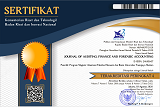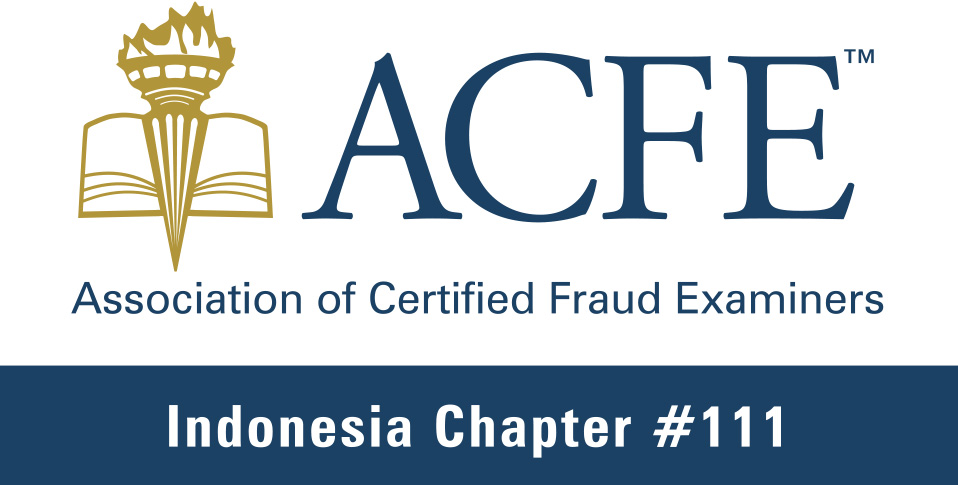Potential Fraud in Student Organizations: A Fraud Hexagon Theory Perspective
Abstract
Keywords
Full Text:
PDFReferences
Abdillah, T. R., Setyadi, E. J., Santoso, S. B., & Mudjiyanti, R. (2022). The Effect of Time Budget Pressure, Obedience Pressure, and Auditor Experience on Audit Judgment (Study at Public Accounting Firm in Yogyakarta Special Region Province). Ratio: Review of Indonesian Contemporary Accounting, 1(1), 22-36. https://doi.org/10.30595/ratio.v1i1.7972
ACFE. (2022). Occupational fraud 2022: a report to the nations. In Occupational Fraud 2022. Association of Certified Fraud Examiners Austin.
Affandi, A., Hakim, T. I. M. R., & Prasetyono, P. (2022). Dimensions of the Fraud Hexagon and Spirituality on Academic Cheating During Online Learning. InFestasi, 18(1), InPress. https://doi.org/10.21107/infestasi.v18i1.14605
Cahyono, H. (2019). The role of students in society. De Banten-Bode: Journal of Community Service (PKM) Setiabudhi, 1(1), 32-41.
Citra Mulyandani, V., Nugraha, A. A., & Kusumastuti, E. D. (2023). Analysis of the Role of Fraud Pentagon Theory in the Detection of Fraud in the Procurement of Goods and Services: (Empirical Study of the Garut Regency Government). Accounthink: Journal of Accounting and Finance, 8(01), 1-12. https://doi.org/https://doi.org/10.35706/acc.v8i01.7130
Desviyana, D., Basri, Y. M., & Nasrizal, N. (2020). Analysis of fraud in the management of village funds from a fraud hexagon perspective. Indonesian Accounting and Finance Studies, 3(1), 50-73. https://doi.org/https://doi.org/10.21632/saki.3.1.50-73
Gasperz, J., Latuamury, J., Silooy, R. W., & Sapulette, S. G. (2023). Detection of Fraud in the Management of BOS Funds Using Hexagon Fraud Theory (Empirical Study of SMA and SMK in Ambon City). JOURNAL LENTERA ACCOUNTING, 8(2), 452-462. https://doi.org/http://dx.doi.org/10.34127/jrakt.v8i2.963
Gautama, S. R., Hakim, T. IM. R., & Muhammad, E. (2023). Interaction of Dark Triad and Fraud Hexagon: An Academic Fraud Perspective. Indonesian Accounting and Business Review, 7(2), 442-463. https://doi.org/10.18196/rabin.v7i2.19807
Hafizh Hakami, A., Rahman Hakim, T. I., & Muhammad, E. (2024). Lessening the Cost of Whistleblowing Through Hierarchy Peer-Reporting Type: A Grid-Group Cultural Theory Perspective. Wahana Riset Akuntansi, 12(1), 16-32. https://doi.org/10.24036/wra.v12i1.12
Handayati, P. (2023). Fraud Analysis in the Management of Village Funds Viewed from the Perspective of the Hexagon Theory. PENANOMICS: International Journal of Economics, 2(3), 11-22. https://doi.org/https://doi.org/10.56107/penanomics.v2i3.112
Hormati, G. A., Adechandra, D., & Pesudo, A. (2019). The Influence of Pressure, Opportunity, Rationalization and Ability on the Tendency of State Civil Apparatus in Committing Accounting Fraud Empirical Study of Regional Work Units of East Bolaang Mongondow Regency. Scientific Journal of Accounting and Humanika, 9 (2), 172-190. https://doi.org/https://doi.org/10.23887/jiah.v9i2.20583
ICW (2023). Results of Monitoring Trends in Corruption Enforcement in 2022.
Laili, A., Tito IM. Rahman Hakim, & Prasetyono, P. (2022). Whistleblowing Determinants: The Interaction Between Micro Social Ethical Environment and Organizational Ethical Leadership. Journal of Accounting and Finance Review, 12(3), 626-640. https://doi.org/10.22219/jrak.v12i3.23531
Moorcy, P. A., Sarwani, S., Suhaili, A., & Rasidah, R. (2024). Perspective of Fraud Hexagon Theory in Academic Fraud Behavior: Explanatory Study on Accounting Students. Owner, 8(1), 130-142. https://doi.org/10.33395/owner.v8i1.2068
Mussa, N. V., Persulessy, G., & Hiariej, N. (2020). Prevention of Fraud in Public Companies. Kupna Journal: Collection of Accounting Articles, 1(1), 41-50. https://doi.org/https://doi.org/10.30598/kupna.v1.i1.p41-50
Nurani, B. K., & Fuad, F. (2023). Asset Misappropriation: A Fraud Pentagon Model Perspective in Microfinance Institutions. Owner: Accounting Research and Journal, 7(1). https://doi.org/10.33395/owner.v7i1.1278
Nurkhin, A., & Fachrurrozie, F. (2018). Analysis of the Influence of Fraud Diamond Dimensions on Academic Fraud Behavior of UNNES Accounting Education Students. Liabilities (Journal of Accounting Education), 1(1), 1-12. https://doi.org/https://doi.org/10.30596/liabilities.v1i1.2026
Oktarina, D., & Ramadhan, N. S. (2023). Academic Fraud Behavior of Accounting Students in Dimensions of Fraud Hexagon Theory. Journal of Auditing, Finance, and Forensic Accounting, 11(1), 33-48. https://doi.org/10.21107/jaffa.v11i1.18432
University of Jember Student Activity Management Guidelines. (2019).
Puspitasari, Y. R., Haryadi, B., & Setiawan, A. R. (2015). THE DIM SIDE OF STUDENT ORGANIZATION FINANCIAL MANAGEMENT. Journal of Multiparadigm Accounting JAMAL, 6.
Revinda, G. (2023). Revinda, G. (2023). Analysis of the Effect of Fraud Hexagon Elements on Village Fund Fraud with Religiosity as a Moderating Variable. UIN Raden Intan Lampung. UIN Raden Intan Lampung.
Rompis, A. I., & Hapsari, A. N. S. (2022). Actions and Motives for Committing Fraud in Student Fund Management. AFRE (Accounting and Financial Review), 5(1), 83-96. https://doi.org/10.26905/afr.v5i1.7468
Rosifa, D., & Supriatna, I. (2022a). Analysis of Factors Affecting the Tendency of Fraud in Village Fund Management (Survey on Village Governments in West Bandung Regency). Indonesian Accounting Research Journal, 2(3), 218-236. https://doi.org/https://doi.org/10.35313/iarj.v2i3.4117
Rosifa, D., & Supriatna, I. (2022b). Analysis of Factors Affecting the Tendency of Fraud in Village Fund Management (Survey on Village Governments in West Bandung Regency). Indonesian Accounting Research Journal, 2(3), 218-236. https://doi.org/https://doi.org/10.35313/iarj.v2i3.4117
Selviana, & Irwansyah. (2023). "THE EFFECT OF FRAUD HEXAGON, ORGANIZATIONAL FACTORS AND INTEGRITY ON ACADEMIC CHEATING PERFORMANCE OF ACCOUNTING STUDENTS" (Vol. 08, Issue 01).
Sofianti, S. P. D. (2018). Forensic Accounting. Jember University Press.
Suryandari, E., & Pratama, L. V. (2021). Determinants of Village Fund Fraud: Testing the Fraud Hexagon, Machiavellian, and Love of Money Elements. Indonesian Accounting and Business Review, 5(1), 55-78. https://doi.org/10.18196/rabin.v5i1.11688
Tinay, A., Karamoy, H., & Sondakh, J. J. (2022). Analysis of Fraud Tendencies in Village Financial Management Using the Fraud Diamond Theory (Empirical Study in Wori District). Journal of Accounting and Auditing Research "Goodwill", 13(2), 216-234. https://doi.org/https://doi.org/10.35800/jjs.v13i2.45790
Umaroh, S. (2019). The Effect of Obedience Pressure, Task Complexity and Independence on Audit Quality at the Inspectorate of Bojonegoro Regency. In Journal of Accounting Audit. Sunan Ampel State Islamic University.
Violetta, G. P., & Kristianti, I. (2021). Disclosure of Fraud in Student Institutions. Indonesian Accounting and Business Review, 5(1), 26-37. https://doi.org/10.18196/rabin.v5i1.11300
Vousinas, G. L. (2019). Advancing the theory of fraud: the SCORE model. Journal of Financial Crime, 26(1), 372-381.
Wijayanto, F. L. (2020). Organizational Commitment, Capability, Leadership Style and Fraud Tendency in Government Sector (Perception of State Civil Apparatus in Salatiga City). Journal of Social Sciences and Humanities, 9(1), 120-130. https://doi.org/https://doi.org/10.23887/jish-undiksha.v9i1.24422
Wolfe, D. T., & Hermanson, D. R. (2004). The fraud diamond: Considering the four elements of fraud. The CPA Journal, 74(12), 38-42.
DOI: https://doi.org/10.21107/jaffa.v12i1.24558
Refbacks
- There are currently no refbacks.
Our Journal indexed by:
Our support tools using:



This work is licensed under a Creative Commons Attribution 4.0 International License.












